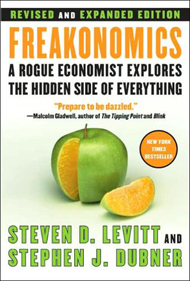
Title: Freakonomics
Authors: Steven Levitt and Stephen Dubner
ISBN-13: 9780060731328
ISBN: 006073132X
Freakonomics
Book review by Joy Hopkins
Freakonomics garnered a lot of attention when it was published back in 2005. Steven Levitt and lesser mentioned co-author, Stephen Dubner, certainly succeed at getting their points across in an easy-going, story-teller fashion. In fact, about half of the book is incredibly enjoyable and interesting as a result. The introductory chapters are full of one light-hearted account after another, be it sumo wrestling jigging in Japan or real estate agent shenanigans. These anecdotes are intelligently crafted to definitively support the authors' main tenet that the incentives (whether positive or negative) driving many of our key decisions are often hidden, but can be unearthed by unconventional thinking and questioning.
The first real disappointment only comes in Chapter 3 when Levitt and Dubner try to apply their same light-hearted tactics to more serious and sensitive topics like race, gender, and economic status. To this end, the authors fail miserably, revealing naive, unsympathetic, and downright distasteful interpretations of the subjects they bring to life. For instance, an entire chapter is designated to the factors driving a child's success in school. Chief among the findings is that success in school is highly correlated with the level of education and economic status of a child's parents. Education, however, is completely ignored in another obviously related chapter about what prevents crime. A stand-alone reading of the crime chapter may lead a reasonable person to believe the answers to our problems in the inner-city are not more educational programs, but rather more police and longer jail sentences aimed to control the lesser-educated, underprivileged populous. The book gets progressively worse culminating with an altogether useless chapter about "high-end and low-end white and black names." Overall, I would not call the authors ill-intentioned or spiteful, but rather astonishingly unaware.
Think of two gifted scientists who are bored with the classic experiments and decide to venture out into uncharted territory. Unfortunately, in this case, the kudos deserved of the two for taking a risk is overshadowed by their failure to really step outside the boundaries of their science and tap into the human element.




